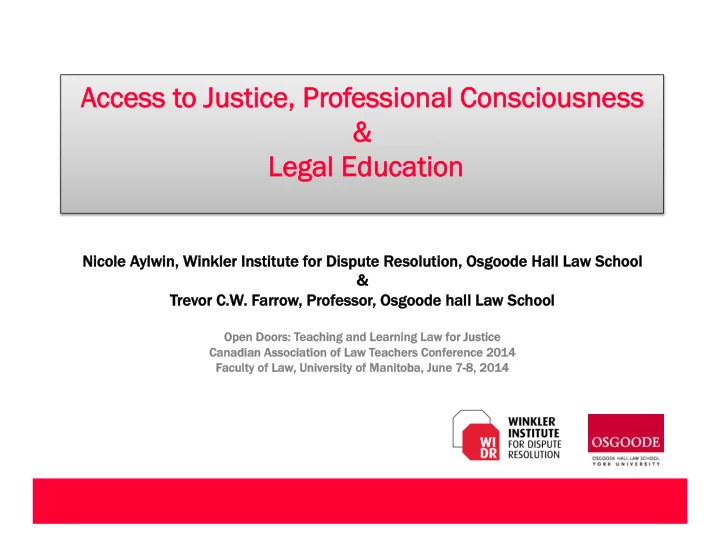

Access t to J Justice, P , Professiona nal C l Cons nsciousne ness & & L Legal E l Education Nicole A Aylwin, W Winkler I Institute f for D Dispute R Resolution, Os Osgoode oode H Hall L Law S Scho hool & & Trevor C C.W. F Farrow, P Professor, Os Osgoode oode ha hall L Law S Scho hool Open D Doors: T Teachi hing a and L Learning L Law f for J Justice Canadian As Association o of L Law T Teache hers C Conference 2 2014 Faculty o of L Law, U University o of M Manitoba, J June 7 7-8, 2 2014
Access t to J Justice – – a a “ “crisis” i in C Canada • Approximately 50% 50% of people will experience a legal problem over any given 3 yr. period Marginalized groups (e.g. low- • income; disabled, aboriginal, etc.) experience a greater number of legal problems There is an increasing number of • self-represented litigants in the court room (who are not there by choice). • Unmet legal needs come with substantial economic and social costs.
Access t to J Justice – – a a s shi hifting p policy l landscape
A n A new p policy l landscape – – k key f features Use a more expansive • definition of access to justice. • Put the public first • Collaborate and cooperate • Simplify and make the system sustainable • Focus on action-oriented response • Focus on outcomes
An Anothe her w way o of l looking a at i it… • Su Subjec ect: p provider t to u user • Obje Object ct: b back-end t to f front-end • Metho hod: i isolation t to c collaboration • Con Conten ent: p process t to o outcome • Ac Accessible: c complex t to s simple • Out Outlook look: u unsustainable t to s sustainable
Need a a s shi hift i in p n professiona nal l cons nsciousne ness. . • Need to see the profession differently. • Need to see the way we provide services differently. • Need to take seriously “public interest” and “access to justice” as the underlying interest of the profession – not a subtopic or subproject. The he “ “Cult lture S Shi hift” & t the he c cha halle lleng nge f for Why? y? le legal p l professiona nals ls • We have a different public, with different needs. • People are demanding different services.
T he he R Role o of L Legal E Education - - l learning t to “thi hink” l like a a l lawyer • Program offerings that facilitate the new paradigm. * Renewed energy towards law, family & relationships • Encourage clinical education (but not at the expense of legal theory). • Teach pluralism as a founding principle not a subtopic. • Teach students how to be innovators.
Tha hank y nk you. . Contact Us Trevor Farrow ACADEMIC DIRECTOR tfarrow@osgoode.yorku.ca Nicole Aylwin ASSISTANT DIRECTOR naylwin@osgoode.yorku.ca (416) 736-5027 winklerinstitute.ca
Recommend
More recommend